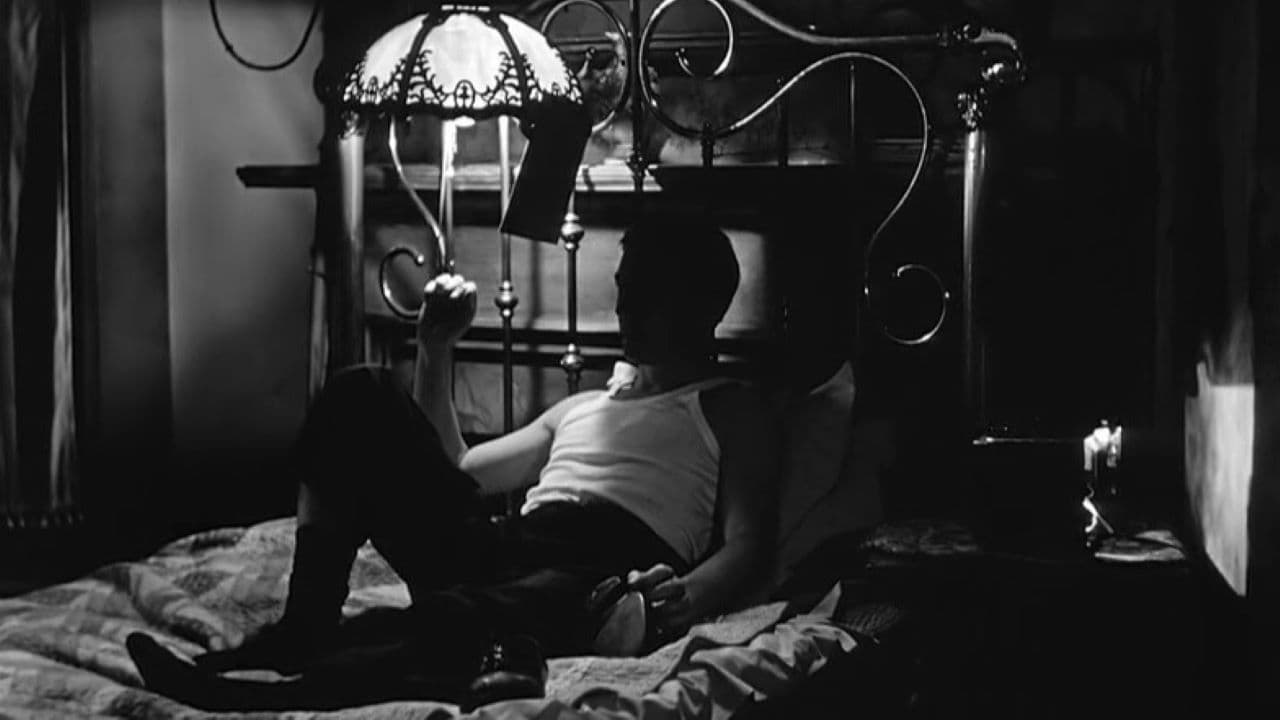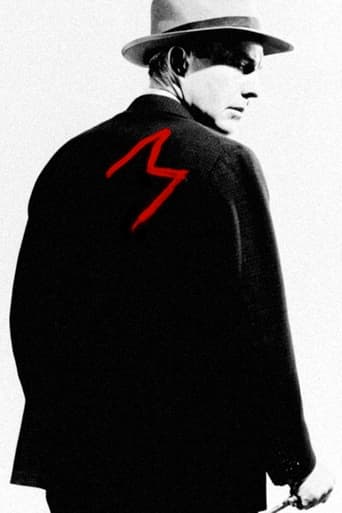Develiker
terrible... so disappointed.
Glimmerubro
It is not deep, but it is fun to watch. It does have a bit more of an edge to it than other similar films.
Philippa
All of these films share one commonality, that being a kind of emotional center that humanizes a cast of monsters.
Skyler
Great movie. Not sure what people expected but I found it highly entertaining.
lawcrossing01
Oh my gosh, what a cheesy scene with the mock lawyer defending the accused against the mobsters and the angry parents. Nothing but shallow, trite, over-emotional, characterizations designed to alarm the audience. Subtly and sophistication ? Not at all. Why have meaningful ideas when the characters can just yell well-worn slogans. Do you like being provoked for the sake of being provoked? If yes then you will love this movie. Absolutely nothing is believable about this movie.
dougdoepke
Occasionally gripping noir from noir's golden period. Middle-age loner Harrow (Wayne) is a serial killer of little girls. His sixth murder alarms much of LA, especially the underworld which feels extra pressure now from the cops. As a result, the various gangs organize in pursuit of the killer before he strikes again. But will the cops and gangsters catch him in time.The movie has many fine touches, except for the final chase whose massive gangland presence without police intervention amounts to a real stretch. Where the film excels is with Harrow alone and acting out his illness. Note how he squeezes off the head of a female doll with a photo of his mother in the background, the significance of which turns up at the end. Also, his caressing of shoelaces from his victims suggests a sexual fetish. As a reader of true crime, I've learned that shoe fetishes are not that unusual-- there seems no end to human oddities. At the same time, there's the telling touch of a little girl's balloon soaring toward the heavens that implies her death at the killer's hands, along with a note of hope for something better. Oddly, actor Wayne has practically no lines until the final segment. There his monstrous nature is somewhat mitigated by a heartfelt recognition of his mother's twisted role that he was apparently too weak to overcome.Ace director Losey makes good use of the many LA locations including the famous Bradbury building from DOA (1950) among others. And that's along with a number of noirish lighting touches. Too bad Hollywood's notorious Blacklist period sent him into exile in England during probably his most productive period.Except for Wayne, the supporting cast is not called upon to express much emotion. Thus attention remains on the killer and the little girls he inveigles with toys and goodies. As indicated earlier, the weakest parts are the staging of the gangland mobs that appear to have buried their differences in favor of large uncontested mob action.Despite the downside, the movie's subject matter challenged taboos of the time and still manages moments of genuine involvement.
tomgillespie2002
The poster for director Joseph Losey's M promises to deliver "the greatest motion picture you've ever seen!". This, of course, isn't true; in fact, it isn't even the great motion picture entitled M you'll ever see. The original movie of the same title, directed by Fritz Lang, is possibly one of the finest pieces of cinema ever made, and one that reflected the political turmoil of Germany at the time as the Weimar Republic start to collapse under the increasing power of the Nazis. Douglas Sirk, a German working in Hollywood, was first approached to helm the remake, but wanted to scrap the original premise but keep the focus on a notorious child-killer. This could not happen, as such a grisly topic was banned in Hollywood, but would be allowed if it was a remake of a classic. Sirk held his ground, and so M was handed to Losey instead.Martin W. Harrow (David Wayne) is a reclusive serial killer who has already gained notoriety throughout the city after a few dead bodies were found, minus their shoes. Inspector Carney (Howard Da Silva) feels the pressure of expectation, resorting to desperate measures by fleecing the regulars at a known criminal hangout in the hope of stumbling upon a clue or lead, as the city's residents are in high- paranoia mode, reporting anyone acting remotely suspicious or seen walking with a child. One old man is hauled in after helping a young girl take her skates off after a fall. Syndicate boss Charlie Marshall (Martin Gabel), seeking an opportunity to divert the attention away from his own criminal activities, rounds up his gang of crooks and brings in drunken lawyer Dan Langley (Luther Adler) in the hope of tracking down the murderer himself. Any American remakes of foreign masterpieces will always be looked upon with some degree of disdain, and I must admit that I went into M expecting a pointless re-hash of what came before. However, under the disguise of a film noir, Losey's M is a damn good movie, with the panic-stricken city eager to turn over their neighbour in the hope of sleeping easy at night easily comparable with Joseph McCarthy's Communist witch-hunts terrorising Hollywood at the time, which saw industry giants pressured into naming names and exiling their co-workers onto the Blacklist. As Harrow, Wayne is subtly effective, sweet-talking his victims and luring them with his whistle. More focus is given to his character than in Lang's film, and Wayne manages to invite more sympathy than Peter Lorre's incarnation as he is eventually hauled in front of a public jury. It certainly doesn't have the dramatic weight or technical wizardry of the 1931 version, but Losey's effort stands out as one of the most gripping noirs of its era.
Bard-8
I can't understand someone not understanding this film, or considering it as anything less than masterful. I saw it on the big screen, and it left me, like its more illustrious predecessor, profoundly disturbed. In fact, David Wayne's "M" is more frightening than Peter Lorre's--Lorre was a brilliant actor, but his rather idiosyncratic appearance makes it easy to tag him as a "monster", and it typecast him as a perverse (and fascinating!) villain for most of his career. David Wayne not only turns in an harrowing and sympathetic (!) performance in this underrated masterpiece, but he does it with a face as bland and Midwestern as Wonder Bread. His casting, and Losey's change of locale and lighting to working class, sun-drenched and sun-faded shots of L.A., make the crimes and the criminal too believable, too naturalistic for comfort. Murder is more frightening in broad daylight than in shadows, where we've been taught to expect it. There are outstanding moments here: Losey's double-coded messages about the female body (the mannequin scene), which--despite lines inserted to please the censors--indicate that sex is behind the child-murders, the incredible hunt in the wonderful Bradbury Building, even a few comedic one liners (when the hapless police force shake up a low-class joint, and they ask the patrons what they're doing in the place, a bum replies, "Slummin'!") But it is the conclusion, the gut-wrenching final "courtroom" scene with David Wayne giving the most realistic, disturbing and moving portrait of psychopathy on the screen, that cements this film as a classic worthy of standing up to its predecessor. And when his "lawyer" questions the mob--and himself, and the viewers--as to who was truly responsible for this man and his evil, the answer is always disturbing. Losey believed that "it takes a village" fifty years ago, and his "M" remains a brand-hot indictment of a corrupt and money-hungry, perverse and puritanical, escapist and scapegoating society.

